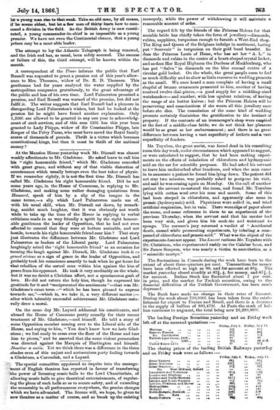At the Mansion House 'yesterday week Mr. Disraeli was almost
' weakly affectionate to Mr. Gladstone. He asked leave to call him us"right honourable friend," which Mr. Gladstone conceded with great grace, and.without any of that visible distortion of countenance which usually betrays even the beat taker of physic. If we remember rightly, it is not the 'first time Mr. Disraeli has called Mr. Gladstone his right -honourable friend. Did he not some years ago, in the -House of -Commons, in replying to Mr. 'Gladstone, and making some rather damaging quotations from Hansard, speak of him by a slip of the tongue in the same terms,—a slip Which Lord Palmerston made use of, with Isis usual skill, when Mr. Disraeli sat down, by remark- ing, amidst much laughter, that it was obviously not worth while to take up the time of the House in replying to verbal criticisms made in so very friendly a itphit by the right -honour- .able gentleman the leader of Opposition, that he had not even affected to conceal that they were at bottom amicable, and not hostile, towards his-right honourable friend near him? That story just illustrates the -difference between Mr. Gladstone and Lord Palmerston as leaders of the Liberal party. Lord Palmerston, laughingly seized the 'right honourable friend' as an occasion for turning the-laugh against Mr.Disraeli, Mr. Gladstone took it en s rand serieux as a sign of'gvace in the leader of Opposiiiou, and probably-took his conscience-smartly to-task when he got hotneior that rebellion of the carnalman within him against the kiss of peace from .his opponent. He took it very creditably on the whole, but it was no doubt a Christian effort, not a %spontaneous gush of love. He did not return the holy kiss, though he expressed his gratitude for it and "reciprocated the sentiments "—that was Mr. Gladstone's exact term—" which he has been pleased to express towards me,"-.-,which is, we take it, a very different matter ;— after which tolerably successful achievement Mr. Gladstone natu- rally drew a moral.






























 Previous page
Previous page